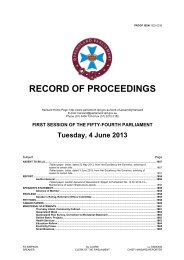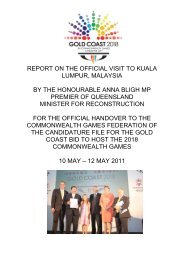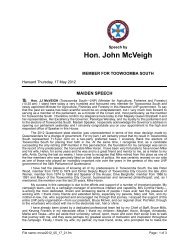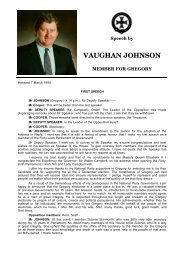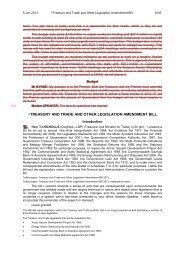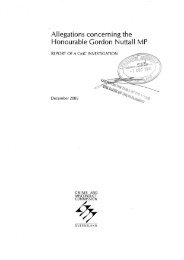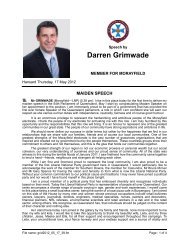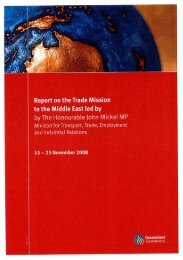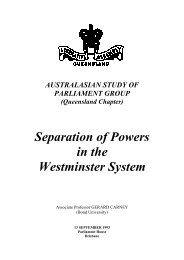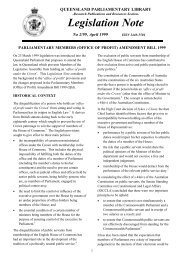weekly hansard - Queensland Parliament - Queensland Government
weekly hansard - Queensland Parliament - Queensland Government
weekly hansard - Queensland Parliament - Queensland Government
You also want an ePaper? Increase the reach of your titles
YUMPU automatically turns print PDFs into web optimized ePapers that Google loves.
2592 <strong>Queensland</strong> Competition Authority Amendment Bill 23 Aug 2005<br />
I wish to provide an example. My partner and I buy a cattle property. We fence it, put in dams,<br />
provide the infrastructure, pay the rates and so on. Another company comes along and puts its cattle on<br />
our property, does not pay for the upkeep and does not pay for the fences. All of a sudden it says that it<br />
is competing against us and it sells its cattle cheaper than our cattle. Well, of course they will be able to<br />
compete because they are not paying for the upkeep or the expenses. This is exactly the same as what<br />
is happening in relation to <strong>Queensland</strong> Rail at this present moment.<br />
Mr NEIL ROBERTS (Nudgee—ALP) (2.49 pm): Through the budget process and support for<br />
effective and socially responsible implementation of national competition policy, the <strong>Queensland</strong> Labor<br />
government has demonstrated its economic credentials and its commitment to the continued economic<br />
development of the state. The results speak for themselves. For the 10th successive year our economy<br />
will outperform the nation.<br />
Economic growth in 2004-05 is estimated to be 4.25 per cent—more than double the two per cent<br />
estimated for the rest of the country. Unemployment is at record lows and is expected to average around<br />
five per cent for the next two years. Consumer spending is forecast to be strong over the next two years,<br />
as is public and private sector capital investment. All of these factors result in a higher standard of living<br />
for <strong>Queensland</strong>ers.<br />
It is an interesting footnote in our history that some of the most significant and lasting economic<br />
reforms have been implemented by Labor governments, particularly at the national level. Freeing up our<br />
financial markets, floating the dollar, active trade engagement with Asia and the implementation of<br />
national competition policy reforms are a few of the more significant.<br />
I have to confess that in 1995 when the agreement was reached between the states and<br />
territories and the Commonwealth to implement national competition policy I, along with many, was<br />
unconvinced that it was going to deliver the economic benefits promoted by its proponents. The Hilmer<br />
report was the subject of significant public debate prior to the formal adoption of national competition<br />
policy in 1995. Like many on both sides of this House, I raised a number of criticisms and concerns<br />
particularly about the way in which national competition policy was being implemented.<br />
I think it is fair to say that there was an ideological agenda being pursued by some which resulted<br />
in undesirable outcomes in some instances. However, I am pleased to record that the <strong>Queensland</strong><br />
government, under the leadership of our Premier, was instrumental in ensuring that national competition<br />
policy was and is now implemented in a more socially responsible way. In particular, it introduced a<br />
fairer public benefits test which takes account of the impact national competition policy might have on<br />
employment and other social factors.<br />
After 10 years of its implementation and the opportunity to observe the outcomes, I now firmly<br />
believe that national competition policy has been the major contributor to our state’s and our nation’s<br />
much-improved economic performance. I am also convinced that it is essential that we remain<br />
committed to the continued implementation of the policy.<br />
As in 1995, there is now a need to continue the debate about further economic reforms in this<br />
country and about the appropriateness of any proposed reforms. With the increasing globalisation of the<br />
markets in which we operate there is a need for continuous improvement in the way in which we<br />
manage our state’s and our nation’s infrastructure. As a state and a nation we are relatively small fry in<br />
international economic terms. For example, we produce about one per cent of world output, compared<br />
with the 30 per cent produced by the United States.<br />
In order for us to maintain and improve our standard of living we must engage in trade with other<br />
nations and also encourage appropriate investment in productive assets. For that to happen our major<br />
infrastructure, including our ports, roads and railways, must operate efficiently and effectively and we<br />
must have the appropriate structure and procedures in place to achieve this. This will help contain costs<br />
and facilitate the delivery of resources and products to where they need to be.<br />
It is for that reason that bills of this nature, although relatively procedural in nature, are an<br />
important step in the continuing process of reform. This bill has as its major aim to facilitate a better<br />
regulatory outcome for our major pieces of infrastructure. It will enable the independent regulator of<br />
competition in <strong>Queensland</strong>—the <strong>Queensland</strong> Competition Authority—to more effectively perform its<br />
role, particularly in instances where major pieces of infrastructure are leased by third parties. As the<br />
independent regulator of competition in the state, the QCA plays a very important role in the<br />
development of our resources by overseeing government monopoly business activities, third party<br />
access arrangements, the competitive neutrality complaints process and the regulation of gas and<br />
electricity distribution businesses.<br />
This bill proposes to address three areas which are important to this process. Firstly, the current<br />
state based access regime does not allow the QCA to directly enforce access undertakings against and<br />
manage disputes in cases where a facility is leased by an operator—that is, where the operator is not<br />
the owner of the asset. Currently, undertakings may only be enforced indirectly via contractual<br />
arrangements between the owner and the lessee. Changes proposed under this bill will enhance the<br />
QCA’s enforcement capabilities and will give it the discretion to take action against access providers<br />
who are not the actual owners of the assets concerned.



